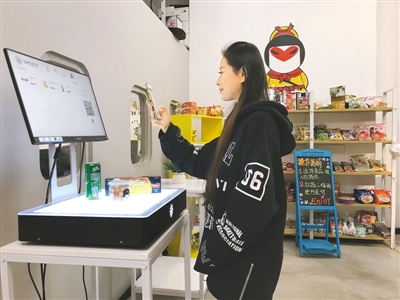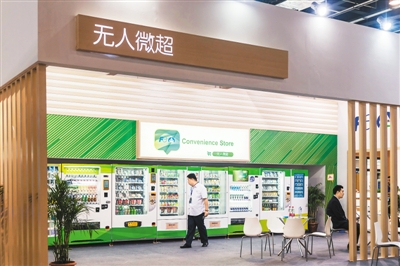The cashier can automatically identify commodity information and amount, and retail enters the intelligent age.


Our reporter Wang Meng photo

On August 15, 2017, the first new retail store in Hangzhou opened. In this store, customers can not only buy food directly, but also experience the convenience brought by artificial intelligence supermarkets such as robot cooking and unmanned cashier. The picture shows customers watching the chef cooking with robots.
Photo by Long Wei (People’s Vision)

On September 27, 2017, at the first unmanned shops and convenience stores exhibition in China, brand unmanned shops, self-service vending systems and related equipment and technology suppliers appeared together. The picture shows an unmanned micro-supermarket.
Wang Gangshe (People’s Vision)
Choose the goods you like, put them at the checkout counter, and you can automatically identify the product information and consumption amount. You can complete the payment by scanning the QR code on the screen. In an unmanned shop in Dongcheng District, Beijing, an intelligent cash register attracted many people’s attention. Don’t underestimate this cash register, which is less than one square meter. By analyzing the data, it can provide consumers with consumption information and bring more experiences to consumers.
With the continuous application and maturity of new technologies, the combination of offline physical stores and online merchants is increasingly close, and new retail is giving birth to new consumption formats, bringing a warm wind to the innovation and development of China.
Retail enters the intelligent age.
In 2016, "unmanned retail" was rarely heard. Some people even thought it was a fantasy, but Ren Feixiang, the founder of Beijing Zhuoweizhi Technology Co., Ltd., was very optimistic about this prospect and devoted himself to it. It was Ren Feixiang’s entrepreneurial team that made the "smart cash register" mentioned at the beginning of the article. In October 2016, Ma Yun, Chairman of the Board of Directors of Alibaba Group, put forward the term "new retail" for the first time. Since then, "new retail" has come.
According to the report of Ali Research Institute, new retail is a data-driven pan-retail form centered on consumer experience, and it can also be considered that new retail is a change proposed with the upgrading of consumption forms. New retail uses the power of technology and data to improve users’ offline buying experience and change traditional consumption patterns. Some people suggest that new retail is to "digitize" retail.
In this context, Ali New Retail, JD.COM Unbounded Retail, Suning Smart Retail and other models have appeared one after another, and explored different consumption forms in different fields. Sending fresh food home in half an hour, eating seafood in supermarkets and small unmanned convenience stores, new retail is becoming the "main force" of consumption upgrading, and the market’s understanding of new retail is gradually clear.
"There are 25% in China’s retail industry & mdash; 35% is wasted on inventory. In the new retail, using big data to accurately match the demand group and the right goods can achieve the purpose of destocking. " Lin Lipeng, a partner of Beijing Zhuoweizhi Technology Co., Ltd., believes that in recent years, the general trend of domestic consumption upgrading is bound to promote retail upgrading. On the other hand, with the end of the online traffic dividend in the Internet, especially in the mobile Internet field, the physical retail industry has also gained new vitality.
Bian Nong, vice president of Suning Retail Group, is also optimistic about the transformation and upgrading of the retail industry. He believes that under the wave of smart retail, China FMCG industry will usher in the biggest period of transformation and pattern reshaping, and a "smart FMCG" revolution is coming. Shen Bowei, the founder of the Magic Box, believes that the core of the new retail is to make user portraits through accurate data analysis, judge user preferences and needs, and build different sales scenarios for different needs of users.
"After three changes in department stores, chain stores and supermarkets, the retail industry is experiencing the fourth revolution, which will bring human beings into intelligent commercial times." Ren Feixiang said.
Give birth to new consumption formats
"E-commerce" represented by Alibaba and JD.COM Mall has changed people’s consumption habits. Online travel represented by Ctrip and Qunar has changed people’s travel modes. The Internet and big data have become the most important tools for industrial upgrading. Behind the "new retail" is the support of big data and cloud platform. With the development of big data applications, smart retail, mobile payment and logistics networks, online and offline integration and win-win are giving birth to new consumption formats and new models.
Mangrove is a tourism brand under Jindian Group. By building a cloud platform, mangrove has achieved industrial upgrading from traditional tourist hotels to leisure shopping. Relying on the strong passenger flow of the mangrove leisure complex and the platform it is building, the new retail of mangroves is also natural.
"The essence of vacation is lifestyle consumption. To do holiday travel, you must be a supplier of lifestyle content." Zhang Baoquan, the founder of the mangrove brand and co-chairman of the board of directors of Jindian Group, believes that the combination of offline experience and online transaction, relying on the heavy assets holiday project of mangrove, will create a new retail empire in the future.
Nowadays, in the fields of tourism, real estate and commerce, with the real landing of new retail and the transformation of consumer terminals, this new format is giving birth to new consumption formats and bringing a warm wind to the innovation and development of China.
Liang Meifen, vice president of Chongbang Group, said that after the introduction of new retail enterprises in physical real estate, 3,000 to 4,000 new members with young consumers as the main body were added every month, and the annual turnover increased by about 10%; According to Huang Zhenwang, general manager of Beijing Cuiwei Department Store Dacheng Road Store, the passenger flow of commercial buildings has doubled from the data of six months after the introduction of new retail formats.
The online and offline integration model of new retail is also boosting the attractiveness of the physical retail industry. Gao Feng, a spokesperson for the Ministry of Commerce, said at the press conference at the beginning of the year that in 2018, under the influence of factors such as the continuous improvement of the macroeconomic situation and the acceleration of the application of modern information technology, the innovation and transformation of retail enterprises will continue to escalate, and the trend of physical retail recovery will continue to increase.
Pay equal attention to data protection and mining
In the operation of new retail stores, in many cases, stores recommend consumers to pay by mobile, which has the intention of accumulating data behind it. By collecting the consumption data of the residents in the communities around the store, we can make big data prediction and determine production by sales. In the future, each new retail store will be able to achieve a "thousands of faces" operation mode to meet the differentiated needs of consumers in different regions.
Although big data can solve many problems, there are also many hidden dangers. According to a survey conducted by China Youth Daily, more than 60% of consumers are allowed to share their personal information with third parties by default in mobile applications. In the face of data, people become more and more "transparent", and personal privacy such as location, consumption habits, physiological identification data and even genetic information may be in the hands of others. When all consumer behaviors become traceable big data, how to protect consumers’ privacy?
According to Lei Yu, a senior engineer of Beijing Zhuoweizhi Technology Co., Ltd., to analyze data, we have to bind data with people. At present, data leakage is generally caused by human factors. To this end, he suggested that as a practitioner, in addition to protecting users’ private data on the technical level, they should also explain the use of user information, and strictly require themselves not to disclose secrets on their own initiative in terms of company values.
According to Zhang Yiteng, a lawyer of Fujian Yingkun Law Firm, the protection of users’ big data in China can be found in many different legal texts. At present, the rapid development of the Internet is not conducive to the development of the industry and the protection of personal privacy. In this regard, experts believe that while developing big data, we should strengthen data protection, regulate data use through legislation, and maximize the potential of big data on the premise of protecting individual rights and interests.
Remodeling and upgrading retail industry
On April 2, Alibaba Group, Ant Financial Group and Hungry announced that Alibaba had signed an acquisition agreement, which will jointly acquire Hungry with Ant Financial for 9.5 billion US dollars.
According to industry analysts, this is another major breakthrough in Alibaba’s new retail strategy, which means that the new Internet retail strategy has formed a complete closed loop in local life services, which will further affect and change urban life.
How will new retail define the future of business? Experts believe that in the future, new retail will change the way of commodity circulation and rebuild China’s data-centric consumption pattern. "Now the new retail is to combine online traffic with offline entities to share people’s traffic". Wang Yongping, secretary general of China Commercial Real Estate Alliance, said that in the next step, new retail will eventually move towards the essence of commerce, and use big data at the consumer end to guide production, so as to find the transformation direction of consumer goods manufacturing in consumption upgrading.
Take the hot unmanned shop in 2017 as an example. It used to be mainly small convenience stores. Zhao Ping, director of the International Trade Research Department of the China Council for the Promotion of International Trade, predicts that with the more and more extensive application of innovative technologies such as smart payment and smart logistics, there may be some new explorations in 2018, such as extending and forming a large-scale "unmanned supermarket" with "people+no one".
And this is also the development opportunity that Ren Feixiang’s entrepreneurial team values. "Digitalization capability has become the third core capability besides the service capability of commodities." Lin Lipeng told reporters, "The future is the digital age. Whether it is a small convenience store or a large supermarket chain, data assets are the most important."
Ren Feixiang believes that we should adhere to the rapid iteration, practice, trial and error and upgrade of software and hardware products and operations. "New retail is valuable and meaningful as long as it can bring merchants higher operating efficiency and lower operating costs and bring consumers a better, faster and more realistic shopping experience. In the long run, new retail should open up online and offline consumption data, commodity data and credit data, and build a new social credit system under the combination of many factors to reshape and upgrade the retail industry. " Ren Feixiang said.